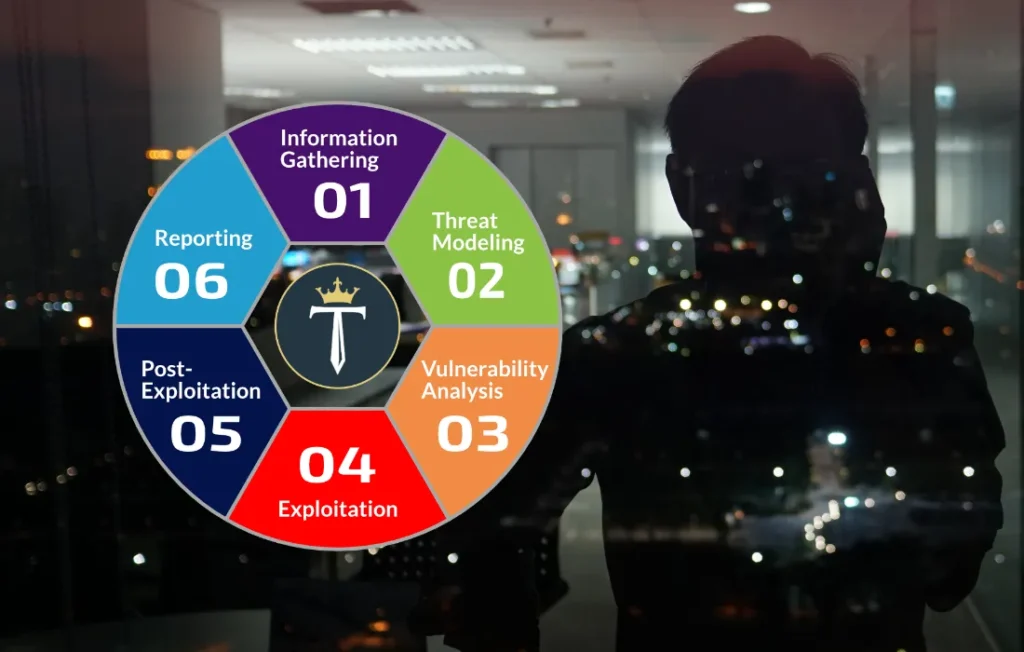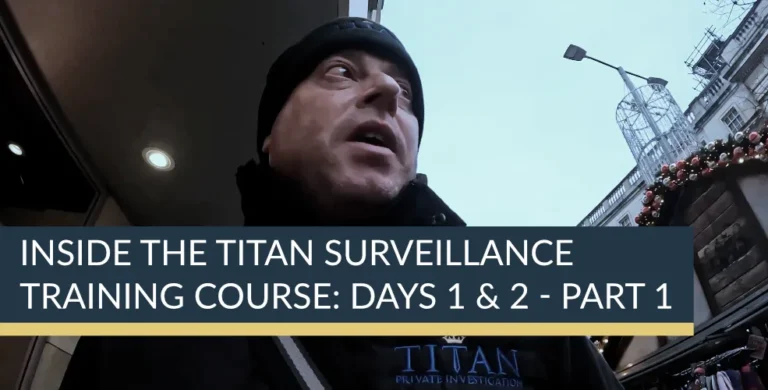Physical Penetration Testing Services: Expose Security Vulnerabilities
Imagine a hacker walking straight into a supposedly secure building, bypassing security measures, accessing sensitive data, and leaving without a trace. It sounds like a scene from a Hollywood thriller, but it’s a real possibility that physical penetration testing, also known as black teaming, can expose. Black teaming is a method of identifying security weaknesses by simulating an attack on a facility. With the potential implementation of Martin’s Law, which focuses on counter-terrorism preparedness, physical security is becoming more critical than ever. This article delves into Titan’s physical penetration testing services, explores how it identifies vulnerabilities, and highlights how it helps businesses strengthen their defences.
Understanding the Different Teaming Colours
In the world of security testing, different “teaming” colours represent specific roles and objectives. These include red, blue, purple, and black teams, each contributing to a comprehensive security strategy.
Red Teaming: Cyber Penetration
Red teams focus on cyber security, simulating the actions of hackers to identify weaknesses in a company’s digital systems. Their goal is to test the strength of an organisation’s cyber defences by attempting to exploit vulnerabilities.
Blue Teaming: Defensive Measures
Blue teams are the defenders, responsible for protecting systems against attacks. They work to identify and fix security issues, ensuring that the organisation’s defences are robust and resilient.
Purple Teaming: Collaborative Security
Purple teaming combines the efforts of red and blue teams. By working together, they simulate real-world attacks in a controlled environment, allowing both teams to learn from each other and improve security strategies.
Black Teaming: Physical Penetration Testing
Black teaming, or physical penetration testing, focuses on the physical security of an organisation. It involves simulating real-world attacks on a facility to identify vulnerabilities in physical barriers, access controls, and human factors. This type of testing is essential for organisations that handle sensitive information or operate in high-risk environments.

The Six-Phase Cycle of Physical Penetration Testing
Physical penetration testing follows a structured six-phase cycle designed to uncover and address weaknesses in physical security. If the team fails to achieve their objectives during the first attempt, the process is repeated until all vulnerabilities are identified and mitigated.
Phase 1: Information Gathering (Passive Reconnaissance)
The first phase involves gathering information from publicly available sources, a process known as open-source intelligence (OSINT). This is akin to detective work, where testers use tools like Google, social media, and public records to learn about the target organisation. The goal is to understand the target’s environment, including the building layout, nearby businesses, and operational details, without raising suspicion.
Phase 2: Target Modelling
In the second phase, testers create a detailed threat model of the target. This involves analysing the organisation, its employees, and its physical premises. Social media platforms and job boards often provide valuable insights into employee roles, responsibilities, and routines. Testers may also look for blueprints, access control systems, and other security measures that could be exploited.
Phase 3: Vulnerability Analysis (Active Reconnaissance)
This phase involves offline research and covert observation. Testers may make phone calls, send emails, or conduct on-site surveillance to gather data. They observe the location to identify security cameras, access points, and the presence of security personnel. They also note employee behaviours, such as how they use ID badges or whether they hold doors open for others. The goal is to collect as much information as possible while remaining undetected.
Executing the Attack: Exploitation and Post-Exploitation
The next two phases focus on executing the attack and analysing the results.
Phase 4: Exploitation (The Attack Process)
During the exploitation phase, testers put their attack plans into action. These plans are based on the information gathered in the earlier phases and typically include both overt and covert strategies. For example, a covert strategy might involve dressing as a courier to gain access to the building, while an overt strategy could involve mimicking employee ID badges and attempting to tailgate an authorised person into a secure area. Testers rely on human nature, such as the tendency to hold doors open for others, to exploit vulnerabilities. Every action is carefully documented, and if the testers successfully breach security, they leave “red flags” to mark their presence.
Phase 5: Post-Exploitation (Debrief)
After the attack, testers analyse the results and discuss what worked and what didn’t. They identify areas where the organisation’s security measures were effective and where improvements are needed. This phase is crucial for understanding how the breach occurred and how similar attacks can be prevented in the future. The findings from this phase form the basis of the final report.
Reporting and Real-World Applications
The final phase of physical penetration testing involves compiling a detailed report and applying the findings to improve security.
Phase 6: Report Writing
The report is a comprehensive document that outlines the vulnerabilities identified during the testing process, the methods used to exploit them, and recommendations for improvement. A well-written report is clear, concise, and actionable, providing organisations with a roadmap for enhancing their physical security.
Who Needs Physical Penetration Testing Services?
Physical penetration testing is particularly beneficial for industries that handle sensitive data, such as finance, healthcare, and aerospace. It is also essential for organisations that need to comply with regulations like GDPR or prepare for counter-terrorism measures under Martin’s Law. For example, public venues and businesses that host large gatherings may require physical penetration testing to ensure they meet legal and regulatory requirements.
Methods Used in Physical Penetration Testing
Testers employ a variety of techniques to simulate real-world attacks and identify vulnerabilities in physical security. These methods include:
- Lock Picking: Bypassing physical locks to gain unauthorised access.
- Badge Cloning: Duplicating security badges to infiltrate restricted areas.
- Social Engineering: Manipulating employees into granting access by exploiting human psychology.
- Tailgating: Following authorised personnel into secure areas without proper identification.
- Fake Deliveries: Posing as delivery personnel to gain entry to restricted zones.
- Emergency Contracting: Pretending to be IT or maintenance staff to access sensitive locations.
Benefits of Physical Penetration Testing
Engaging in professional physical penetration testing offers numerous advantages for organisations:
- Identifying Vulnerabilities: Testing uncovers weaknesses that may not be apparent through standard security assessments, allowing organisations to address them proactively.
- Employee Training and Awareness: Realistic scenarios help employees recognise potential threats and respond effectively, improving overall security awareness.
- Regulatory Compliance: Regular testing ensures compliance with industry regulations, reducing the risk of fines and reputational damage.
- Enhanced Security Strategy: Insights gained from testing inform broader security strategies, improving resilience against both physical and digital threats.
Challenges in Physical Penetration Testing
While highly effective, physical penetration testing is not without its challenges. Organisations must navigate legal, ethical, and logistical considerations to ensure successful outcomes.
- Legal and Ethical Boundaries: Securing permissions and adhering to laws is essential to avoid legal repercussions.
- Risk of Detection: The covert nature of testing means there’s always a chance of being discovered, which could cause unnecessary alarm.
- Employee Reactions: Simulated breaches can cause stress or anxiety among employees, highlighting the need for clear communication and pre-test briefings.
- Handling Sensitive Information: Testers may encounter sensitive data during assessments, requiring strict protocols to ensure confidentiality.
Why Physical Penetration Testing is Essential for Modern Business Security?
Physical penetration testing, or black teaming, is a vital component of a comprehensive security strategy. By simulating real-world attacks, organisations can identify vulnerabilities, enhance employee awareness, and strengthen their defences against potential threats. As security threats continue to evolve, the need for physical penetration testing is growing. Organisations should view it as an essential investment in their overall security posture.
At Titan Private Investigation Ltd, we specialise in providing tailored physical penetration testing services to help businesses protect their assets, employees, and reputation. Contact us today to learn how we can help you secure your organisation and stay one step ahead of potential threats. Stay vigilant, stay secure.
Physical Penetration Testing Services: Who do I call?
For further advice and information in regard to our UK Physical Penetration Testing Services, please feel free to speak to one of our case handlers and advisors in complete confidence by email, telephone, or at one of our offices nearest you.
London Physical Penetration Testing – Call the Titan Investigations London Office 020 39046622
Birmingham Physical Penetration Testing – Call the Titan Investigations Birmingham Office 0121 7162442
Cambridge Physical Penetration Testing – Call the Titan Investigations Cambridge Office 01223 662022
Derby Physical Penetration Testing – Call the Titan Investigations Derby (Head Office) 01332 504256
Leeds Physical Penetration Testing – Call the Titan Investigations Leeds Office 0113 4574066
Leicester Physical Penetration Testing – Call the Titan Investigations Leicester Office 0116 2436520
Nottingham Physical Penetration Testining – Call the Titan Investigations Nottingham Office 0115 9646950
Manchester Physical Penetration Testing – Call the Titan Investigations Office 0161 3023008
Sheffield Physical Penetration Testing – Call the Titan Investigations Sheffield Office 0114 3499400
Truro Physical Penetration Testing – Call the Titan Investigations Truro Office 01872 888706
Alternatively, you can contact us directly using our fully confidential contact form at enquiries@titaninvestigations.co.uk or chat directly using our Live Chat facility, and one of our UK Physical Penetration Testing Services team will get right back to you.














